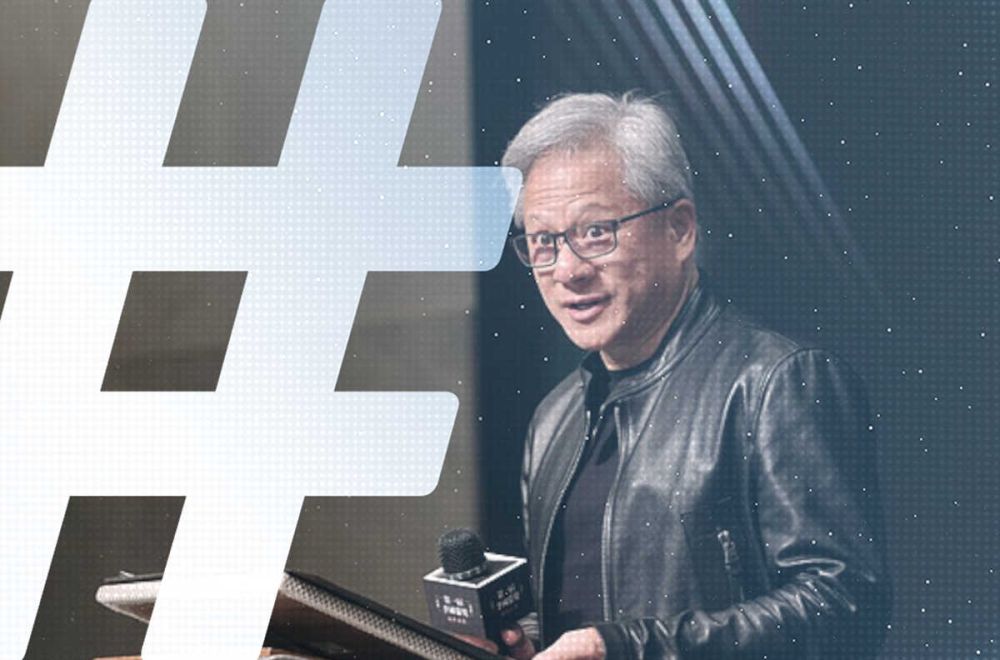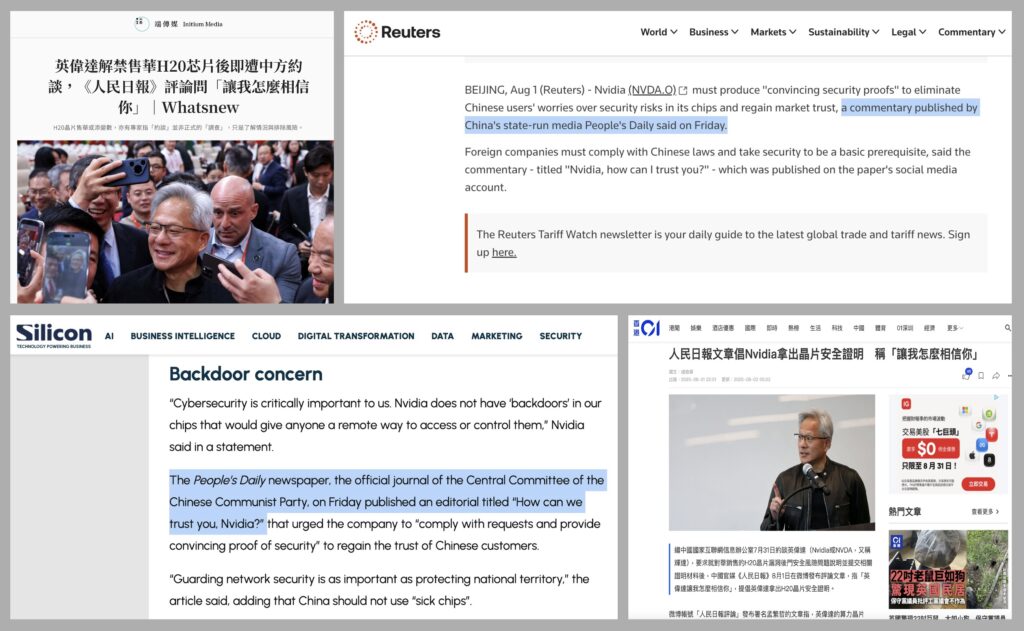
Remember that time the Chinese Communist Party’s official People’s Daily newspaper sharply criticized chipmaker Nvidia over allegations that its H20 chip had “backdoor” vulnerabilities? Yeah, never happened. I’ll explain.
On July 31, the Cyberspace Administration of China summoned Nvidia to explain security concerns it had aired in a public release related to its concerns over its H20 chip. The CAC claimed that US lawmakers had previously called for exported advanced chips to be equipped with tracking and positioning functions, and that American AI experts had revealed that Nvidia’s tracking and positioning technologies were “already mature,” to use the CAC’s language.
Nvidia strenuously denied the allegations, saying that “Nvidia’s chips have no backdoors and do not allow anyone to remotely access or control them,” according to Taiwan’s United Daily News. The next day, headlines in Chinese and English around the world reported that the Chinese Communist Party’s official People’s Daily had published a commentary called “How Can I Trust You, Nvidia?” (英偉達讓我怎麼相信你), warning that cybersecurity breaches could trigger nightmare scenarios and declaring that “safeguarding cybersecurity is just as important as protecting national territory.”

When you understand the highly disciplined nature of the editorial process within the flagship newspaper of the CCP, which can be read as signal tower transmitting views from the top leadership, then you understand how serious the commentary in question would be. At just 20 pages on its fullest day, with anywhere from two to seven pages being ads, the People’s Daily is precious political real estate — and it is reserved for seriousness.
Make no mistake: a signal to Nvidia about its alleged security vulnerabilities on the commentary page of the People’s Daily would be serious. But that is not — not exactly — what this was.
“Your Party newspaper commentary guy here.”
In fact, the “How Can I Trust You, Nvidia?” commentary was not published in the print newspaper. It was posted to the “People’s Daily Commentary” (人民日报评论) account on the popular Chinese social media and messaging app WeChat.

Some of you are already saying: What difference does that make? A lot of difference. Sure, this commentary was also “official” in important ways. It was written by Meng Fanzhe (孟繁哲), a boy-faced commentator at the People’s Daily who has been cited jointly as an editor of the page-five commentary section of the paper.
But there are many layers of “official” in China, and these can be (and are) exploited by state media for varying strategies.
This was not a stern commentary of reprimand in the pages of the People’s Daily. It was an unmuzzled and more tonally personal rebuke that was tailor-made for viral dissemination on social media. If you look at the commentary in context — and how many media reporting the story actually did this, I wonder — it is clear that this is exactly how it was pitched. Meng was pushed out to center stage and his youthful face presented to the audience — something that the People’s Daily newspaper never does. His written commentary was accompanied by a video version for the chummy series “The Comment Guys Speak” (评论君开讲).
To see just how invisible Meng Fanzhe generally is at the People’s Daily, check out this in-site search at the People’s Daily Online portal (also, mind you, not the same thing as the newspaper), which yields exactly 0 results. At people.cn, which skews heavy toward content from the newspaper, he does appear, nearly always in his role as a joint editor on page five. He has also managed a handful of front-page commentaries like this earnest one on flood season vigilance from the “Today’s Talk” (今日谈) column.
Meng was pushed out to center stage and his youthful face presented to the audience — something that the People’s Daily newspaper never does.
Then, importantly, look at how Meng identifies himself in his post. He finishes with the buddy-buddy line: “Your Party newspaper commentary guy here. I welcome everyone to leave comments and share your views and opinions.” But he never identifies himself as “a People’s Daily commentator” (人民日报评论员). Why? Because that is the ultra-serious suit-and-tie designation for official commentaries that speak clearly to the consensus views of the leadership. Here, instead, we have the suits nudging a youthful voice out into the open, as if to say: “Fanzhe, go toy with Jensen Huang and the Nvidia people. Let’s make them squirm a bit.”
This is the important distinction that perhaps every media outlet reporting on this story missed. And how, in fact, they all collectively became part of the viral wall of intimidation facing Nvidia in China. This was not a statement from the Party’s lectern. It was an attack-dog tactic, not unlike the way the Global Times, a pugnacious spin-off of the People’s Daily, is often used to gnash its teeth, even when the flagship newspaper keeps its rhetorical cool.
Speaking of the Global Times, we can also note in this case how its former editor-in-chief Hu Xijin (胡锡进), a Party media guy through and through, referred to Meng’s commentary. Writing on Weibo about the WeChat post — it was never anything more — he pushed the piece as a “Party newspaper blockbuster commentary” (党报重磅评论). Hu’s “blockbuster” language perfectly encapsulates the nature and intent of Meng Fanzhe’s viral commentary, which was meant to kick up a storm because a storm might be useful. Hu did not call it a People’s Daily commentary.




















